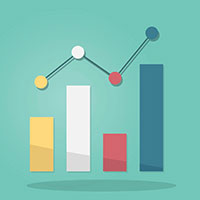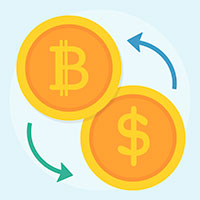While Forex is an exciting and lucrative financial market, many traders face difficulties when trying to make steady profits and grow their trading account. In fact, most beginners on the market blow their first trading account in a few weeks because they lack the understanding of basic trading concepts and don’t pay too much attention to risk management.
That’s why we’ve compiled a list of steps to guide you through your trading journey. Follow these steps and you’ll be well ahead of other novice traders who fail to understand the importance of education, risk management, trading strategies, and journals, to name a few points from the list.
What does it take to become a Forex trader?
You don’t become a Forex trader overnight. It takes a lot of dedication and discipline to become a successful trader, but many traders have achieved that goal. Trading is just like any other business. In the beginning, you haven't the slightest clue what pips, Fibonacci levels, or Elliott Waves are, but with time you’ll get to know these concepts and move on to other trading topics. That’s why education is the single most important part of becoming a Forex trader.
Steps to becoming a successful trader
The following steps could act as a map of what you need to focus on to trade Forex from home. These are, in my opinion, the most important points that beginners on the market need to understand to get a solid foundation in Forex trading.
Educate yourself
As we've already mentioned, education is the most important point on our list. Start with the basic terminology of Forex trading and move on to more difficult concepts. There should never be a pause in your learning process, but it takes some time to put the theory into practice. Once you grasp one concept, learn another one to get a feeling for the differences among various trading concepts. Once you have an understanding of the various ways the market can be traded, you can choose the one that best suits your needs.
Don’t overtrade on a demo account
Demo accounts are a great way to get your feet wet on the market and to familiarise yourself with your trading platform. However, many beginners make the mistake of spending too much time demo trading. Demo accounts can’t replicate the real emotions involved in trading, such as greed and fear. A losing trade on a demo account will not have the same emotional impact as a losing trade on a real account. That’s why you shouldn’t spend too much time on a demo account. As soon as you grasp the basics, invest a small amount in a real account and trade with small position sizes until you gain more experience.
Only invest what you can afford to lose
Trading carries a significant risk of losing your investment, especially if you’re a beginner. That’s why you should only invest money that you can afford to lose. Don’t put your entire life savings into your trading account.
Risk management is crucial
Risk management is probably the single most important tool that separates successful traders from unsuccessful ones. Take two professional traders side by side, and take risk management away from one of them. Chances are that the trader without risk management, even as a professional, will end up blowing their trading account.
Learn the basic rules of risk management while you’re on a demo account, and develop your skills further once you switch to a real account.
Control your emotions
Just like risk management, controlling your emotions is vitally important to becoming a Forex trader. Emotions can interfere with your decision-making process, and fear and greed can easily lead to costly trading mistakes. Risk management is one of the ways you can practice controlling your emotions, while having a comprehensive trading strategy is another way which will be covered in the following point.
Build a trading strategy
A well-round and detailed trading strategy should be a part of a larger trading plan, and given the importance of it, you should start developing your own trading strategy as soon as possible. A trading strategy should include the rules of entering into a position, your entry and exit points, market analysis, and other points that you feel are important. By having a written strategy, you can avoid trading based on emotions as you’ll have a complete set of rules for entering and exiting the market.
Keep a trading journal
Besides a trading strategy, you should also keep a trading journal if you’re serious about becoming a Forex trader. A trading journal consists of journal entries, in which you describe each trade as soon as you make it. For example, an entry could include the reasons you entered into a trade, the currency pair, the entry price, and the stop loss and take profit levels.
It’s also important to update the journal entry once the trade is closed. Was the trade a winner or loser? If it was a loser, what went wrong? Regular journal retrospectives will help you in identifying patterns which led to losing trades.
Don’t neglect fundamentals
Our final point on how to become a Forex trader is fundamentals. Never neglect the importance of fundamentals on the Forex market. The truth is that beginners tend to focus on technical analysis at first, and while there is nothing wrong with this, fundamentals should get an equal amount of attention. Fundamental factors create trends and reverse them in the first place, so make sure to learn as much about fundamentals as you can.
Final words – how to become a Forex trader?
In this article, we covered the most important points on how to be a Forex trader. Education comes first and foremost, and with good reason; you should never stop learning new trading concepts. With time, you’ll start to combine various concepts which will make your trading life easier. Risk management, control over your emotions, trading strategies, journals, and other points are important as well, so make sure to refer back to this article whenever you feel that your trading performance needs a boost.
 For active traders and investors, mastering the art of trading volatility is a crucial skill. Volatility, in financial terms, refers to the extent to which asset prices fluctuate over time. High volatility markets experience rapid price swings...
For active traders and investors, mastering the art of trading volatility is a crucial skill. Volatility, in financial terms, refers to the extent to which asset prices fluctuate over time. High volatility markets experience rapid price swings... The global financial market operates as a dynamic ecosystem, where understanding the connections between different market movements can provide invaluable insights for forecasting...
The global financial market operates as a dynamic ecosystem, where understanding the connections between different market movements can provide invaluable insights for forecasting... The forex market, also known as the foreign exchange market, stands as the largest and most traded financial market globally. FXTM is committed to equipping our clients...
The forex market, also known as the foreign exchange market, stands as the largest and most traded financial market globally. FXTM is committed to equipping our clients... Cryptocurrency trading has rapidly grown into a bustling and dynamic market that attracts traders from around the world. With the potential for significant profits...
Cryptocurrency trading has rapidly grown into a bustling and dynamic market that attracts traders from around the world. With the potential for significant profits... The year 2023 has been a landmark period for the international broker Octa (formerly known as OctaFX), characterized by significant achievements and substantial contributions...
The year 2023 has been a landmark period for the international broker Octa (formerly known as OctaFX), characterized by significant achievements and substantial contributions...